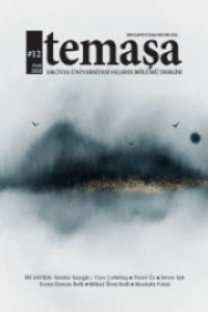TRANSENDENTAL İDEALİZM VE İHMAL EDİLMİŞ ALTERNATİF ELEŞTİRİSİ
Transendental idealizm tezi Kant’ın ulaşmayı istediği hedefler ve etkileri açısından eleştirel felsefenin en temel tezidir. Bu tez zaman-mekânın bilginin subjektif formları olduğunu ve bizim bildiğimiz tüm şeyler bu zaman-mekânsal çerçevede verildiğinden, kendinde şeyleri değil onların tezahürlerini bileceğimizi dile getirir. Bu tezin haklılığı ortaya çıktığı ilk günden beri tartışma konusu olagelmiştir. Bu çerçevede transendental idealizm tezine birçok eleştiriler yöneltilmiştir. Bu eleştirilerden biri ihmal edilmiş alternatif eleştirisidir. Bu eleştiriye göre Kant, zaman ve mekânın aynı anda hem bilen öznenin hem de kendinde şeylerin objektif özelikleri olabileceği ihtimalini göz ardı etmiştir. Oysa bu ihtimali kabul ederek de sentetik apriori bilgi mümkün kılınabilir ve dolayısıyla da zaman-mekânın subjektif formlar olduğunu kabul etmek bir zorunluluk değildir. Bu eleştirinin doğrulu Kant’ın eleştirel felsefesi açısından oldukça yıkıcı sonuçlara sahiptir. Bu nedenle de gerek Kant felsefesini savunanların gerekse de eleştirenlerin dikkate alması gereken oldukça önemli bir eleştiridir
Anahtar Kelimeler:
Kant, Transendental İdealizm, Zaman, Mekân, İhmal Edilmiş Alternatif
TRANSCENDENTAL IDEALISM AND CRITIQUE OF NEGLECTED ALTERNATIVE
Transcendental idealism is the basic thesis of the critical philosophy in terms of Kant’s aims and its effects. This thesis expresses that time and space are subjective forms of knowledge and we know only appearance not things in itself because of all things that we know given us in spatiotemporal framework. From the beginning rightness of this thesis has always been a matter of debate. In this context many criticism has been directed to transcendental idealism. Neglected alternative is one of these criticism. According to this criticism Kant have neglected alternative which time and space are both objective features of subject and things in itself at the same time. Whereas by accepting this alternative we can make synthetic a priori propositions and so to accept that time and space are subjective forms is not necessary. The accuracy of this criticism has devastating results in terms of Kant’s critical philosophy. Therefore it is very important criticism which Kant advocates and critics need to consider.
Keywords:
Kant, Transcendental Idealism, Time, Space, Neglected Alternative,
___
- Allison, Henry E. , Kant’s Transcendental Idealism An Interpretation and Defense, Yale University Press, New Haven and London 1983.
- Caswell, Matthew, “Kant on the Diabolical Will: a Neglected Alternative?”, Kantian Review, Vol. 12, July 2007, s. 147-157
- Dicker, Georges, Kant’s Theory of Knowledge, Oxford University Press, Oxford 2004.
- Falkenstein, Lorne, Kant’s Intuitionism: A Commentary on the Transcendental Aesthetic, University of Toronto Press, 1995.
- Gardner, Sebastian, Kant and Critique of Pure Reason, Routledge Press, London and New York 2003.
- Guyer, Paul, Kant and Claims of Knowledge, Cambridge University Press, Canbridge1987.
- Hartnack, Justus, Kant’s Theory of Knowledge, Trn. M. Holmes Harsthorne, Hackett Publishing Company, New York 2001.
- Kant Immanuel, Critique of Pure Reason, Trn. Paul Guyer and Allen Wood, Cambridge Universty Press, Cambridge 2009.
- Parson, Charles, “The Transcendental Aesthetic”, The Cambridge Companion to Kant, Ed. by Paul GUYER, Cambridge University Press, Cambridge 1992, s. 62-100.
- Paton, H.J. , Kant’s Metaphysic of Experience Volume I, Unwin Ltd, London 1936.
- Shabel, Lisa, “The Transcendental Aesthetic”, The Cambridge Companion to Kant’s Critique of Pure Reason, Ed. by Paul Guyer, Cambridge University Press, Cambridge 2010.
- Skirberkk, Gunnar; Gilje, Nils, Antik Yunan’dan Modern Döneme Felsefe Tarihi, Çev. Emrullah Akbaş, Şule Mutlu, Üniversite Kitabevi Yay. , İstanbul 1991.
- Smith, Norman Kemp, A Commentary to Kant’s Critique of Pure Reason, Macmillan, London 1918.
- Specht, Andrew F., Kant and Neglected Alternative, Yayımlanmamış Tez, Syracuse University, A.B.D. 2014.
- ________,“F. A. Trendelenburg and the Neglected Alternative”, British Journal for the History of Philosophy, Vol. 22, No. 3, 2014, s. 514-534.
- Topakkaya, Arslan, Felsefe, Din ve Kültürde Zaman, Paradigma Yay. , İstanbul 2013.
- ISSN: 2148-371X
- Yayın Aralığı: Yılda 2 Sayı
- Başlangıç: 2014
- Yayıncı: Prof. Dr. Arslan Topakkaya / Erciyes Üniversitesi Felsefe Bölümü
Sayıdaki Diğer Makaleler
NURETTİN TOPÇU: İTAATKÂRLIK VE İSYAN BİR İNANÇ PSİKOLOJİSİ TASLAĞI
KINALIZADE’DE MUTLAK HİKMETİN ERDEM OLAN HİKMETTEN FARKI
TANZİMAT DÜŞÜNCESİNDE HÜRRİYET FİKRİ
UMBERTO ECO: AÇIK YAPIT VE SINIRSIZ YORUM TARTIŞMASI
TRANSENDENTAL İDEALİZM VE İHMAL EDİLMİŞ ALTERNATİF ELEŞTİRİSİ
